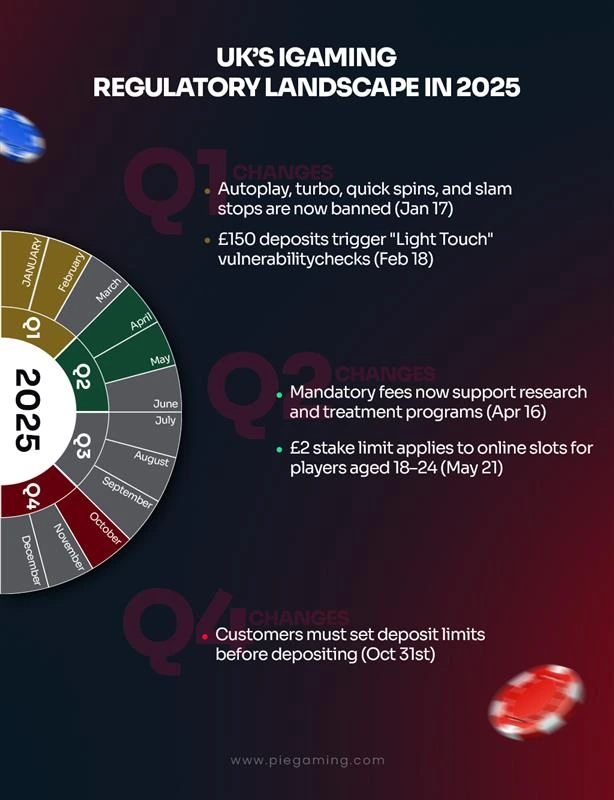Online Casino & Sports Betting Regulations in the United Kingdom | 2025
- Author:Palak Madan
- Read Time:8 min
- Published:
- Last Update:April 30th, 2025

The UK’s online sports betting and casino regulations in 2025 focus on permits, following rules, and keeping players safe. Companies must follow new laws to make sure games are fair and encourage responsible gambling.
Every day, another operator gets caught in the UK’s regulatory net.
The Gambling Commission’s crackdown has changed the market, leaving even established companies surprised.
The rules have changed dramatically.
Player verification, spending caps, and addiction monitoring are no longer optional– they are mandatory.
Smart operators are turning these challenges into opportunities, using compliance as a marketing tool to attract safety-conscious players.
In Britain’s iGaming industry, which is projected to grow by $11.7 million in 2025, understanding these changes makes all the difference between market leadership and bankruptcy.
(Source: First)
Why 2025 Is A Pivotal Year For iGaming Regulations In The UK?
2025 is bringing major updates to the UK sports betting laws & other forms of betting regulations. Here’s what’s happening and why it matters:
1) New Game Design Rules
Since January 17, 2025, online games must follow stricter rules.
Features like autoplay, turbo, quick spins, and slam stop are now banned to make games safer and clearer for players.
These changes aim to slow down gameplay and give players more time to think about their betting decisions.
Operators must update all their games to remove these features or face penalties from the Gambling Commission.
(Source: Gambling Commission RTS updates)
2) Money Checks
From February 28, 2025, operators must run money checks when players deposit £150 (net) over 30 days, down from the old £500 limit.
These “Light Touch” vulnerability checks ensure people only bet what they can afford.
These checks use public data to look at a player’s money situation without needing personal details.
Operators would need systems that can track deposits across a rolling 30-day period and trigger checks automatically.
3) Mandatory Fees
By April 6, 2025, a required fee system will replace voluntary payments to fund research, prevention, and treatment programs.
This legal levy ensures all operators contribute fairly based on their size and revenue.
The money will go to approved organizations working on harm reduction.
Operators should consider this additional expense as a part of their 2025 financial planning.
4) Marketing Rules
Starting May 1, 2025, players must actively choose what types of marketing they want to receive and how they want to receive it.
Operators must create opt-in options for different marketing channels (email, SMS, phone calls, etc.
Players can opt out of marketing easily at any time.
All marketing materials must clearly show safer betting messages and tools.
5) Betting Limits
New laws will set maximum stake limits for online slot games.
- £5 per game cycle for adults aged 25 and over
- £2 per game cycle for young adults aged 18 to 24
These limits aim to reduce betting harm while maintaining industry survival.
The government will review these limits within 5 years.
If age verification systems aren’t reliable enough, regulators may apply the £2 limit to everyone.
Operators must update their platforms to enforce these limits automatically.
Here’s how this affects businesses:
- The new framework will make it easier to understand what’s required, reducing uncertainty for operators.
- Compliance costs will increase as new systems and technologies need to be implemented.
- Despite stricter rules, the UK sports betting market is still expected to grow as technology improves and player habits change.
- Innovation in game design will need to focus on entertainment value rather than rapid play or high stakes.
- Operators who leverage the new rules have chances to grow and will likely perform better.
Understanding Licensing Requirements for Running iGaming Businesses in the UK
Running an iGaming business in the UK requires proper licensing. Here’s everything you need to know in simpler terms:
UK Betting Rules Explained
Betting is completely legal in the UK but is carefully regulated.
The casino & sports Betting regulations in the UK are set by the Betting Act 2005, creating the framework for all betting activities.
The Gambling Commission watches over everything to make sure games are fair, honest, and transparent.
The Three Types of Licenses You’ll Need:
1) Operating Licenses
What they are: The main permit that allows your business to offer betting services.
Available Types:
- iGaming Licenses
- Land-based betting licenses (for physical locations)
- Ancillary Licenses
What you need to prove:
- That you are honest and trustworthy
- That your business has enough money to operate.
- That you have experience in betting or related fields.
Application Process:
- Takes about 16 weeks from start to finish.
- Involves deep background checks by the commission.
- Requires detailed paperwork about your business plan.
Costs:
- You pay an application fee upfront.
- You also pay yearly fees to maintain your license.
2) Personal License
What they are: Licenses for individuals working in betting roles.
Two main types:
Personal Functional Licenses (PFLs) for staff like couriers and cashiers.
Personal Management Licenses (PMLs) for people in management positions.
What you need to provide:
- Identity documents (passport, driver’s license)
- History of where you’ve lived.
- Background information about yourself.
Time and Cost:
- Takes about 2 weeks to process.
- Fees vary depending on the type of license.
3) Premises License
What they are:
Licenses for physical betting locations (not needed for online-only).
Who issues time:
Your local town council, not the Gambling Commission.
Following The Rules
1) Money Laundering Prevention
- You must verify who your customers are.
- You need systems to spot suspicious activities.
- You must report suspicious transactions to the National Crime Agency (NCA)
- All these requirements come from the Proceeds of Crime Act 2002.
2) License Conditions And Code Of Practice
- These are specific rules you must follow to keep your license.
- Include requirements for preventing money laundering.
- Include rules about protecting vulnerable bettors.
- Cover how you advertise your services.
3) Technical Standards
Remote betting Software Technical Standards (RTS) set requirements for:
- Ensuring games are fair and random.
- Protecting player funds and personal information.
- Including responsible betting features.
- Ensuring your games work correctly and reliably.
Recent Updates And Enforcement In UK (12th Feb, 2025)

UK’s iGaming Regulations in 2025
(Source: Hansard Gambling Levy Commission 2025)
Deeper Insights on the Statutory Betting Levy
- The levy represents what officials are calling a “watershed moment” in betting regulation.
- It is expected to rise by approximately £90-100 million annually.
- Different rates are applied to different sectors based on their relation to betting harm:
- Online operators will pay comparatively higher rates.
- The Tote and on-course bookmakers will pay lower rates than land-based operators.
- Licensed operators risk losing their licenses if they fail to pay.
Commissioning Structure and Governance
The levy funds will be managed through a sophisticated commissioning structure:
- The Office for Health Improvement and Disparities (OHID) will be the lead commissioning body for prevention in England.
- A dedicated levy board will monitor how much money is spent and if it works.
- An advisory group will give guidance based on evidence.
- 30% of levy funds will go to prevention programs.
The Scale Of Betting Harm: Exclusive Data
Recent parliamentary discussions have highlighted the extent of betting-related harm:
- Betting harm affects 2.5% of the UK adult population (approximately 1.5 million adults)
- Online slot machines are the most dangerous type of betting because:
- They’ve grown by 61% in the last five years.
- People are more likely to play them for too long at once compared to other betting activities.
- 70% of betting sessions that only use slots last more than three hours.
- The monetary cost of betting harm is £1.4 billion each year (some say it could be up to £5 billion.
- People with betting problems are nine times more likely to need hospital care.
Northern Ireland: Interesting Considerations
The parliamentary debate revealed interesting details about Northern Ireland’s position:
- While Northern Ireland can make its own betting rules, iGaming companies serving Northern Ireland customers must have a Great Britain betting license.
- This makes things tricky because iGaming isn’t fully under Ireland’s control.
- The UK government is ready to help Northern Ireland leaders make new rules.
- Northern Ireland seems to have more betting platforms than other parts of the UK.
The Future of iGaming Regulations in the UK
The UK iGaming world is changing fast.
As regulators tighten up their grip, smart companies are finding ways to turn these challenges into advantages.
In this £14 billion industry, how companies handle these changes will make or break their success.
What’s Coming Next In Regulations?
UK gambling companies must now implement improved data analytics to identify at-risk players before they spend too much.
Soon, keeping an eye on player behavior all the time, not just when they hit betting limits, will become normal.
The UK’s tough approach is spreading to other countries, too, so betting companies need systems that can quickly adjust to different rules.
Those who build flexible compliance systems will find it easier to grow into new markets later.
As iGaming reaches across the border, having one system that works everywhere gives companies a real advantage.
How Is The Market Changing?
1) Companies coming together
Small businesses are teaming up or selling to bigger companies because following the rules costs too much.
Many small operators simply can’t afford to hire teams of people to handle all the regulations.
Some are finding smart partners to share these costs with, while others are joining forces in larger groups where they can split the expenses.
This is changing the UK market– We’re seeing fewer companies overall, but those that remain are bigger and stronger.
Additionally, some new specialized compliance service providers are appearing that make it easier for small businesses to follow betting rules.
2) Games are changing
Game makers are now focusing on new kinds of fun now that quick-play features are banned.
Instead of games that focus on fast betting, they are building experiences that keep players interested in different ways.
We are seeing games with stories, skill challenges, and social elements that make playing more about enjoyment than just placing bets.
These games keep people playing without pushing them to bet more.
3) Using Blockchain
This technology creates a secure record system that works across all betting platforms.
It helps track if players can afford to play and respect their self-bans everywhere.
Players can set up one self-exclusion profile that works on all platforms, closing gaps in protection.
The system can check a player’s financial situation across different sources without sharing personal details.
These unchangeable records create perfect tracking for the regulators, which means fewer investigations and checkups.
What Does the Future Hold?
The UK betting world will probably end up with fewer companies, but those that remain will be stronger and offer safe betting experiences.
Rules will get tougher but also clearer, helping businesses know what they need to do.
Companies that see these changes as chances to grow, not just problems to solve, will be the winners.
Those who invest in compliance technology will now gain lasting benefits in the market, where keeping players safe and making money will increasingly work together.
Read More – How to Start An Online Casino In 2025?
Wrapping Up…
The UK’s rules in 2025 show a good mix of fun and safety.
The industry has taken up a “player-first” mindset, with casinos and sports betting in the UK competing on safety features as much as bonuses.
The UK market has found a sweet spot where responsible bettors enjoy their hobbies, vulnerable people receive protection, and businesses grow.
This practical middle ground could become the template for other countries to follow worldwide.
FAQs
-
Is betting legal in the UK?
Yes, betting is legal in the UK. The Betting Act 2005 allows it as long as betting companies have a license from the UK Gambling Commission (UKGC) to ensure everything is fair.
-
How much does it cost to get a gambling license in the UK?
Smaller gambling businesses pay around £4,224, while larger ones can pay up to £91,686. These are just the basic license fees, and companies also need to pay extra yearly fees and costs related to their business locations.

Palak Madan is a enthusiastic writer at PieGaming. With over 2+years of experience crafting engaging content and a strong literature background, Palak brings a unique perspective to the world of words. Her ability to blend creativity with strategic thinking has made her a sought-after content creator. She's eager to dive deep into the intricacies of iGaming software, uncovering the stories behind the technology and translating complex features into compelling narratives.
-
 Palak Madan February 13, 2026
Palak Madan February 13, 2026Learn what virtual sports betting is, how it works, and why it’s growing fast in iGaming. A clear, practical guide for operators and betting platforms.
-
 Palak Madan September 29, 2025
Palak Madan September 29, 2025Discover the latest online casino and sports betting regulations in Algeria. Learn how the laws impact operators, players, and the future of iGaming in the region.
-
 Monika Gola August 5, 2025
Monika Gola August 5, 2025Armenia offers golden opportunities to iGaming operators. Here, get a quick insight into online casino and sports betting regulations in Armenia.
-
 Palak Madan June 20, 2025
Palak Madan June 20, 2025Canada’s 2025 iGaming laws vary by province. This guide breaks down what’s legal, what’s changing, and where online casinos and sports betting stand…
-
 Monika Gola June 19, 2025
Monika Gola June 19, 2025Mexico is actively developing as a promising iGaming market. It’s a golden opportunity for operators to learn about online casino and sports betting…
-
 Monika Gola June 5, 2025
Monika Gola June 5, 2025Planning to launch your iGaming business in Malta? This free guide covers sports betting and online casino regulations in Malta to help you…
-
 Palak Madan April 29, 2025
Palak Madan April 29, 2025This guide lists the top 10 sports betting odds providers in 2025, helping operators choose fast, accurate, and reliable data sources for their…
-
 Monika Gola April 28, 2025
Monika Gola April 28, 2025Spain has witnessed remarkable growth in the iGaming industry globally. This blog discusses online casino and sports betting regulations Spain. Stride along till…
-
 Monika Gola April 10, 2025
Monika Gola April 10, 2025Sports betting has been in the roots of South Africa. It’s an opportunity for operators to run an iGaming business and rake in…
-
 Palak Madan February 26, 2025
Palak Madan February 26, 2025Sports betting software development involves creating custom platforms. These platforms help manage bets, process payments securely, and provide live betting options. They also…
-
 Palak Madan November 20, 2024
Palak Madan November 20, 2024Starting a sports betting business in the UK involves ensuring compliance, obtaining licenses, selecting software, setting up payment systems, and much more. Let’s…
-
 Monika Gola August 9, 2024
Monika Gola August 9, 2024A trusted sportsbook platform handles odds, risks, and real-time betting. This guide highlights the top sportsbook software providers to trust. Launching or scaling…
-
 Nikita Ajmani July 11, 2024
Nikita Ajmani July 11, 2024Sports Betting in the iGaming Industry: A market finally getting its dues! Existing for over a century in various parts of the world,…
-
 Simranjeet Kaur July 5, 2024
Simranjeet Kaur July 5, 2024In the high-stakes sports betting world, fortunes can be made or lost as a result of a single match outcome. But what if…
-
 Palak Madan May 28, 2024
Palak Madan May 28, 2024This blog explores the world of sports betting, covering new sports betting trends like mobile apps and AI, key challenges, and future growth…
-
 Simranjeet Kaur May 14, 2024
Simranjeet Kaur May 14, 2024Let’s understand sports betting and odds in sports betting, how they are calculated, and how as a beginner, you can read them.
-
 Palak Madan April 4, 2024
Palak Madan April 4, 2024Explore the future of online sports betting in 2025 and learn how innovation, data, and evolving regulations are shaping growth and global market opportunities.
-
 Palak Madan March 6, 2024
Palak Madan March 6, 2024Launching or running a sportsbook? This Online Sports Betting Sites Checklist reveals key features and compliance steps that you don’t want to miss.
-
 Palak Madan February 8, 2024
Palak Madan February 8, 2024Discover everything you need to know about white label betting exchange solutions in 2025. Learn how they work, and how to launch your own platform.
-
 Palak Madan February 1, 2024
Palak Madan February 1, 2024See how white label sportsbook solutions make online sports betting better. Explore custom features, quick setup, and benefits for operators in 2025.
-
 Monika Gola January 31, 2024
Monika Gola January 31, 2024Discover the top 6 tips for selecting reliable turnkey betting platform providers to enhance the betting experience for your customers. Click to read now.
-
 Palak Madan January 16, 2024
Palak Madan January 16, 2024Here’s the list of the leading 5 whitelabel sports betting exchange providers worth exploring. Note their exceptional services & offerings setting them apart.
-
 Palak Madan December 30, 2023
Palak Madan December 30, 2023Want to launch your own sportsbook? Learn how to create your own sports betting platform from scratch — from licensing to compliance. Start smart in 2025.
-
 Monika Gola December 6, 2023
Monika Gola December 6, 2023The growing popularity of sports betting is opening doors for operators. Read here the history, present and future of the global sports betting…
Voila!
See you in your inbox soon!

Stay ahead of the game. Subscribe for exclusive content, updates, and insiders!
We use cookies to enhance and personalize your browsing experience. By continuing to use our website, you agree to our Privacy Policy.




